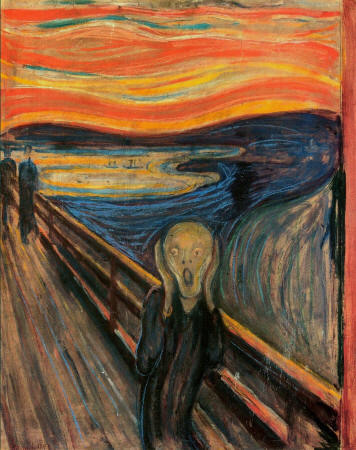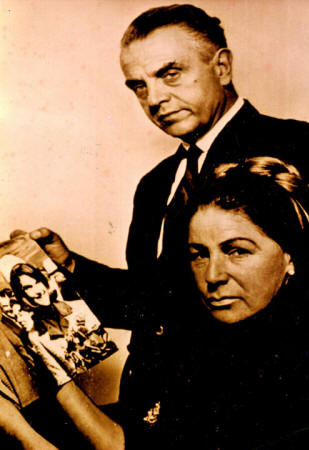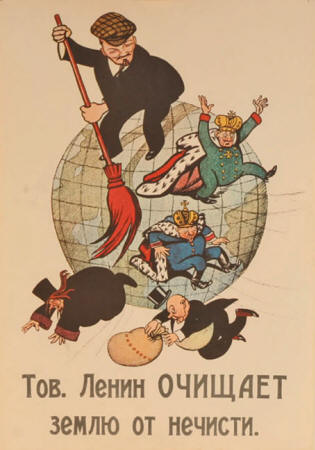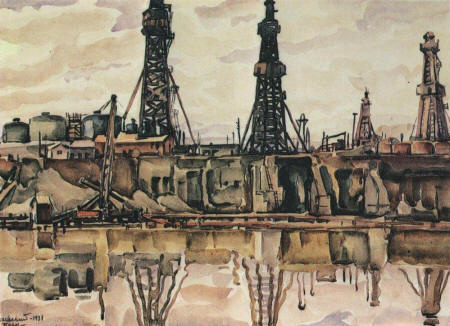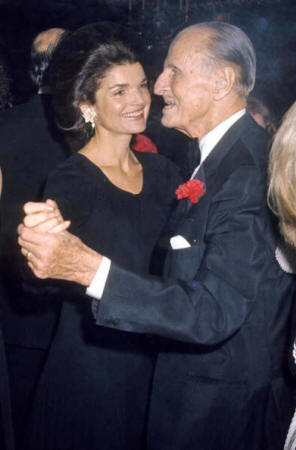|
The Mysterious Mr. de Mohrenschildt
October 14, 2013
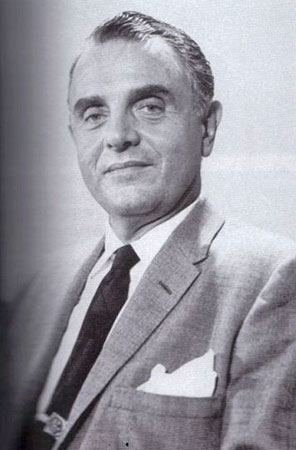
George de Mohrenschildt
"Must have angered a lot of people" In 1976, more than a decade after the assassination of President John F. Kennedy, a letter arrived at the CIA, addressed to its director, the Hon. George Bush.
The letter was from a desperate-sounding man in
Dallas, who spoke regretfully of having been indiscreet in talking about Lee
Harvey Oswald and begged Poppy for help:
The writer signed himself "G. de Mohrenschildt."
by Edvard Munch
The CIA staff assumed the letter writer to be a crank.
Just to be sure, however, they asked their boss:
Bush responded by memo, seemingly self-typed:
Not recall? Once again, Poppy Bush was having
memory problems. And not about trivial matters.
George de Mohrenschildt was not just the
uncle of a roommate, but a longtime personal associate. Yet Poppy could not
recall - or more precisely, claimed not to recall - the nature of de
Mohrenschildt’s relationship with the man believed to have assassinated the
thirty-fifth president.
This would have been an unusual lapse on anyone’s part. But for the head of an American spy agency to exhibit such a blasé attitude, in such an important matter, was over the edge.
At that very moment, several federal
investigations were looking into CIA abuses - including the agency’s role in
assassinations of foreign leaders. These investigations were heading toward
what would become a reopened inquiry into Kennedy’s death.
Could it be that the lapse was not casual, and
the acknowledgment of a distant relationship was a way to forestall inquiry
into a closer one?
Writing back to his old friend, Poppy assured the Mohrenschildt that his fears were entirely unfounded. Yet half a year later, de Mohrenschildt was dead. The cause was officially determined to be suicide with a shotgun. Investigators combing through de Mohrenschildt’s effects came upon his tattered address book, largely full of entries made in the 1950’s.
Among them, though apparently eliciting no
further inquiries on the part of the police, was an old entry for the
current CIA director, with the Midland address where he had lived in the
early days of Zapata:
De Mohrenschildt and the
Oswalds
When Poppy told his staff that his old friend de Mohrenschildt "knew Oswald," that was an understatement. From 1962 through the spring of 1963, de Mohrenschildt was by far the principal influence on Oswald, the older man who guided every step of his life.
De Mohrenschildt had helped Oswald find jobs and
apartments, had taken him to meetings and social gatherings, and generally
had assisted with the most minute aspects of life for Lee Oswald, his
Russian wife, Marina, and their baby.
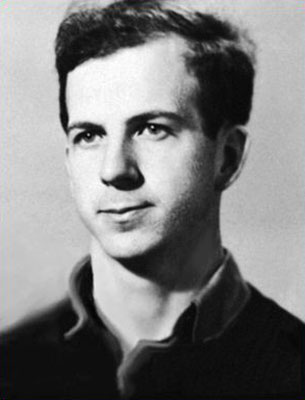 Lee Harvey Oswald, 1961 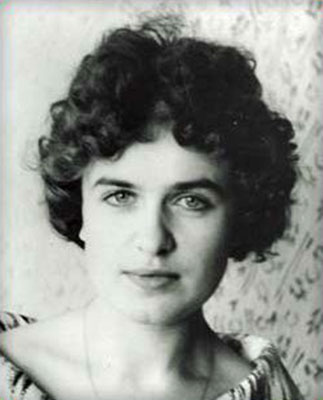 Marina Oswald De Mohrenschildt’s relationship with Oswald has tantalized and perplexed investigators and researchers for decades.
In 1964, de Mohrenschildt and his wife Jeanne
testified to the Warren Commission, which spent more time with them than any
other witness - possibly excepting Oswald’s widow, Marina.
The Commission, though, focused on George de
Mohrenschildt as a colorful, if eccentric, character, steering away every
time de Mohrenschildt recounted yet another name from a staggering list of
influential friends and associates. In the end, the commission simply
concluded in its final report that these must all be coincidences and
nothing more.
The de Mohrenschildts, the Commission said,
apparently had nothing to do with the assassination.
George and Jeanne de
Mohrenschildt
Even the Warren Commission counsel who questioned George de Mohrenschildt appeared to acknowledge that the Russian émigré was what might euphemistically be called an "international businessman."
For most of his adult life, de Mohrenschildt had
traveled the world ostensibly seeking business opportunities involving a
variety of natural resources - some, such as oil and uranium, of great
strategic value.
The timing of his overseas ventures was
remarkable. Invariably, when he was passing through town, a covert or even
overt operation appeared to be unfolding - an invasion, a coup, that sort of
thing.
For example, in 1961, as exiled Cubans and their
CIA support team prepared for
the Bay of Pigs invasion in Guatemala,
George de Mohrenschildt and his wife passed through Guatemala City on what
they told friends was a month-long walking tour of the Central American
isthmus.
On another occasion, the de Mohrenschildts
appeared in Mexico on oil business just as a Soviet leader arrived on a
similar mission - and even happened to meet the Communist official. In a
third instance, they landed in Haiti shortly before an unsuccessful coup
against its president that had U.S. fingerprints on it.
A Russian-born society figure was a friend both of the family of President Kennedy and his assassin, Lee Harvey Oswald.
A series of strange coincidences providing the
only known link between the two families before Oswald fired the shot
killing Mr. Kennedy in Dallas a year ago was described in testimony before
The Warren Commission by George S. de Mohrenschildt.
He was actually much more intriguing - and mystifying.
As Norman Mailer noted in his book
Oswald’s Tale, de Mohrenschildt possessed,
A Name Never Dropped
During all these examinations, and notwithstanding de Mohrenschildt’s offhand recitation of scores of friends and colleagues, obscure and recognizable, he scrupulously never mentioned that he knew Poppy Bush.
Nor did investigators uncover the fact that in
the spring of 1963, immediately after his final communication with Oswald,
de Mohrenschildt had traveled to New York and Washington for meetings with
CIA and military intelligence officials.
He even had met with a top aide to Vice
President Johnson. And the commission certainly did not learn that one
meeting in New York included Thomas Devine, then Bush’s business colleague
in Zapata Offshore, who was doing double duty for the CIA.
Had the Warren Commission’s investigators comprehensively explored the matter, they would have found a phenomenal and baroque back-story that contextualizes de Mohrenschildt within the extended petroleum-intelligence orbit in which the Bushes operated. Getting America Into World War I The de Mohrenschildts were major players in the global oil business since the beginning of the twentieth century, and their paths crossed with the Rockefellers and other key pillars of the petroleum establishment.
George de Mohrenschildt’s uncle and father ran
the Swedish Nobel Brothers Oil Company’s operations
in Baku, in Russian Azerbaijan on the
southwestern coast of the Caspian Sea.
This was no small matter. In the early days of
the twentieth century, the region held roughly half of the world’s known oil
supply. By the start of World War I, every major oil interest in the world,
including the Rockefellers’ Standard Oil, was scrambling for a piece of
Baku’s treasure or intriguing to suppress its competitive potential. (Today,
ninety years later, they are at it again.)
In 1915, the czar’s government dispatched a second uncle of George de Mohrenschildt, the handsome young diplomat Ferdinand von Mohrenschildt, to Washington to plead for American intervention in the war - an intervention that might rescue the czarist forces then being crushed by the invading German army.
President Woodrow Wilson had been
reelected partly on the basis of having kept America out of the war.
But as with all leaders, he was surrounded by
men with their own agendas. A relatively close-knit group embodying the
nexus of private capital and intelligence-gathering inhabited the highest
levels of the Wilson administration.
Secretary of State Robert Lansing was the
uncle of a diplomat-spy by the name of Allen Dulles.
Wilson’s closest adviser, "Colonel" Edward
House, was a Texan and an ally of the ancestors of James A. Baker III,
who would become Poppy Bush’s top lieutenant. Czarist Russia then owed fifty
million dollars to a Rockefeller-headed syndicate.
Keeping an eye on such matters was the U.S.
ambassador to Russia, a close friend of George Herbert Walker’s from St.
Louis.
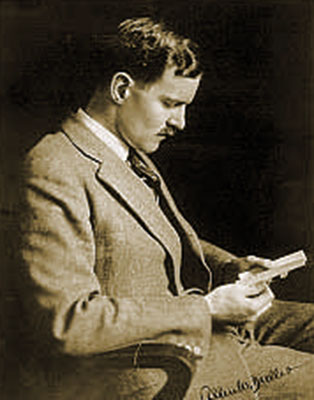
Allen Dulles
during WW I
Once the United States did enter the war, Prescott Bush’s father, Samuel Bush, was put in charge of small arms production.
The Percy Rockefeller-headed Remington Arms
Company got the lion’s share of the U.S. contracts. It sold millions of
dollars worth of rifles to czarist forces, while it also profited handsomely
from deals with the Germans.
In 1917, Ferdinand von Mohrenschildt’s mission to bring America into the world war was successful on a number of levels. Newspaper clippings of the time show him to be an instant hit on the Newport, Rhode Island, millionaires’ circuit. He was often in the company of Mrs. J. Borden Harriman, of the family then befriending Prescott Bush and about to hire Prescott’s future father-in-law, George Herbert Walker.
Not long after that, Ferdinand married the
step-granddaughter of President Woodrow Wilson.
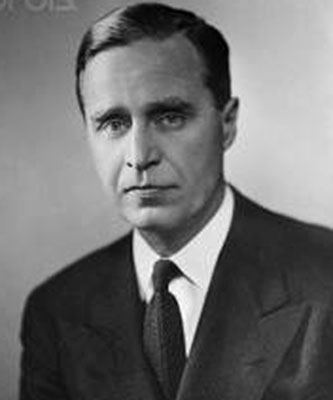 Prescott Bush 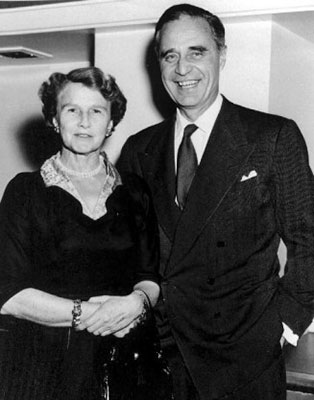 Prescott Bush,
Dorothy Walker Bush
In quick succession, the United States entered World War I, and the newlywed Ferdinand unexpectedly died.
The von Mohrenschildt family fled Russia along
with the rest of the aristocracy. Emanuel Nobel sold half of the Baku
holdings to Standard Oil of New Jersey, with John D. Rockefeller Jr.
personally authorizing the payment of $11.5 million.
Over the next couple of decades, members of the
defeated White Russian movement, which opposed the Bolsheviks and fought the
Red Army from the 1917 October Revolution until 1923, would find shelter in
the United States, a country that shared the anti-Communist movement’s
ideological sentiments.
What the von Mohrenschildts
escaped.
Bush and de Mohrenschildt Families - Deeply Intertwined In 1920, Ferdinand’s nephew Dimitri von Mohrenschildt, the older brother of George, arrived in the United States and entered Yale University.
His admission was likely smoothed by the
connections of the Harriman family, which soon persuaded the Bolshevik
Russian government to allow them to reactivate the Baku oilfields.
At that point, the Harriman operation was being
directed by the brilliant international moneyman George Herbert Walker, the
grandfather of Poppy Bush.
Baku Oil Rigs
by Konstantin Bogaevsky
The Soviets had expropriated the assets of the Russian ruling class, not least the oil fields.
Though ultimately willing to cooperate with some
Western companies, the Communists had created an army of angry White Russian
opponents, who vowed to exact revenge and regain their holdings. This group,
trading on an American fascination with titles, was soon ensconced in (and
often intermarried with) the East Coast establishment.
The New York newspapers of the day were full of
reports of dinners and teas hosted by Prince This and Count That at
the top of Manhattan hotels.
Dimitri von Mohrenschildt plunged into this milieu. After graduating from Yale, he was offered a position teaching the young scions of the new oil aristocracy at the exclusive Loomis School near Hartford, Connecticut, where John D. Rockefeller III was a student (and his brother Winthrop soon would be).
There, Dimitri became friendly with Roland
and Winifred "Betty" Cartwright Holhan Hooker, who were
prominent local citizens.
Roland Hooker was enormously well connected; his
father had been the mayor of Hartford, his family members were close friends
of the Bouviers (Jackie Kennedy’s father’s family), and his sister was
married to Prince Melikov, a former officer in the Imperial Russian Army.
While Dimitri von Mohrenschildt clearly enjoyed the high-society glamour, in reality his life was heading underground.
Dimitri’s lengthy covert résumé would include
serving in the Office of Strategic Services wartime spy agency and later
cofounding Radio Free Europe and Radio Liberty. In 1941, Dimitri also
founded a magazine, the Russian Review, and later became a professor at
Dartmouth.
When the Hooker marriage unraveled, Dimitri began seeing Betty Hooker. In the summer of 1936, immigration records show that Dimitri traveled to Europe, followed a week later by Betty Hooker with her young daughter and adolescent son. Betty’s son, Edward Gordon Hooker, entered prep school at Phillips Academy in Andover, Massachusetts.
There, he shared a small cottage with George H.
W. "Poppy" Bush. Bush and Hooker became inseparable. They worked together on
Pot Pourri, the student yearbook, whose photos show a handsome young Poppy
Bush and an even more handsome Hooker.
The friendship would continue in 1942, when both
Bush and Hooker, barely eighteen, enlisted in the Navy and served as pilots
in the Pacific. Afterward, they would be together at Yale. When Hooker
married, Poppy Bush served as an usher.
The relationship between Bush and Hooker lasted
for three decades, until 1967, when Hooker died of an apparent heart attack.
He was just forty-three.
Six years after Hooker’s death, Poppy Bush would
serve as surrogate father, giving away Hooker’s daughter at her wedding to
Ames Braga, scion of a Castro-expropriated Cuban sugar dynasty.
Another Careful Disconnect The relationship couldn’t have been much closer.
Yet Bush never mentions Hooker in his memoirs or
published recollections, even though he finds room for scores of more
marginal figures. Certainly his family was aware of Hooker.
Poppy’s prep school living arrangements would have mattered to Prescott Bush. The Bush clan is famously gregarious, and like many wealthy families, it puts great stock in the establishment of social networks that translate into influence and advantage. Prescott took a strong interest in meeting his children’s friends and the friends’ parents, as expressed in family correspondence and memoirs.
Moreover, as a prominent Connecticut family with
deep colonial roots, the Hookers would have had great appeal for Prescott
Bush, an up-and-coming Connecticut resident with political aspirations and a
great interest in the genealogy of America’s upper classes.
In 1937, Betty Hooker and Dimitri von Mohrenschildt married.
By then, Dimitri had been hired by Henry Luce as
a stringer for Time magazine. Prescott would likely have been keen to know
his son’s roommate’s stepfather - this intriguing Russian anti-Communist
aristocrat, with a background in the oil business and a degree from Yale,
working for Prescott’s
Skull and Bones friend Luce.
Meanwhile, Dimitri’s younger brother, George, had been living with their family in exile in Poland, where he finished high school and then joined a military academy and the cavalry. In May 1938, George arrived from Europe and moved in with his brother and new sister-in-law in their Park Avenue apartment.
Young George de Mohrenschildt came to America
armed with the doctoral dissertation that reflected the future trajectory of
his life: "The Economic Influence of the United States on Latin America."
The oil south of the border was certainly of
interest to Wall Street figures such as Prescott Bush and his colleagues,
who were deeply involved in financing petroleum exploration in new areas.
From Émigré to Spy The White Russian émigrés in the United States were motivated by both ideology and economics to serve as shock troops in the growing cold war conflict being managed by Prescott’s friends and associates.
No one understood this better than Allen Dulles,
the Wall Street lawyer, diplomat, and spy-master-in ascension.
Even in the period between the two world wars,
Dulles was already molding Russian émigrés into intelligence operatives. He
moved back and forth between government service and Wall Street lawyering
with the firm Sullivan and Cromwell, whose clients included United Fruit and
Brown Brothers Harriman.
The latter was at that time led by Averell and
Roland Harriman and Prescott Bush.
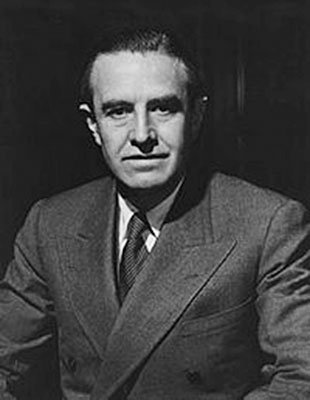
W. Averell Harriman
Whether in government or out, Dulles’s interests and associates were largely the same.
He seemed to enjoy the clandestine work more
than the legal work.
As Peter Grose notes in Gentleman Spy:
The Life of Allen Dulles, he worked during the 1940 presidential
campaign to bring Russian, Polish, and Czechoslovak émigrés into the
Republican camp.
Dimitri von Mohrenschildt was a star player in
this game on a somewhat exalted level.
He found sponsorship for a role as an academic
and publisher specializing in anti-Bolshevik materials, and later became
involved in more ambitious propaganda work with Radio Liberty and Radio Free
Europe.
Younger brother George was more willing to get
his hands dirty.
He took a job in the New York office of a French
perfume company called Chevalier Garde, named for the Czar’s most elite
troops, the Imperial Horse Guards. His bosses were powerful czarist Russian
émigrés, well connected at the highest levels of Manhattan society, who
worked during World War II in army intelligence and the OSS.
One of them, Prince Serge Obolensky, had
escaped Soviet Russia after a year of hiding and became a much-married New
York society figure whose wives included Alice Astor.
His brother-in-law Vincent Astor was secretly
asked by FDR in 1940 to set up civilian espionage offices in Manhattan at
Rockefeller Center.
Astor was soon joined in this effort by Allen
Dulles.
and Jacqueline Kennedy
Onassis
1975
The next stop for George de Mohrenschildt was a home furnishings company.
His boss there was a high-ranking French
intelligence official, and together they monitored and blocked attempts by
the Axis war machine to procure badly needed petroleum supplies in the
Americas.
Young de Mohrenschildt then traveled to the
southwest, where he exhibited still more impressive connections.
Ostensibly there to work on oil derricks, he
landed a meeting with the chairman of the board of Humble Oil, the Texas
subsidiary of Standard Oil of New Jersey, predecessor to Exxon.
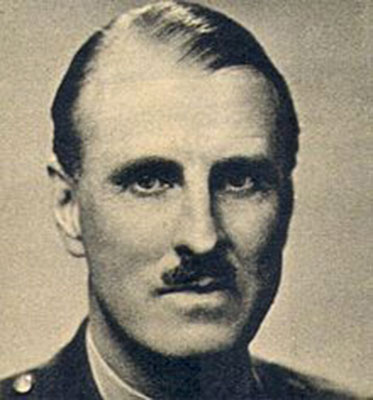
Prince Serge Obolensky
circa 1943
The jobs kept becoming more interesting. By the midforties, de Mohrenschildt was working in Venezuela for Pantepec Oil, the firm of William F. Buckley’s family.
Pantepec later had abundant connections with the
newly created CIA and was deeply involved in foreign intrigue for decades.
The Buckley boys, like the Bushes, had been
in Skull and Bones, and Bill Buckley,
whose conservative intellectual magazine National Review was often
politically helpful to Poppy Bush, would in later years admit to a stint
working for the CIA himself.
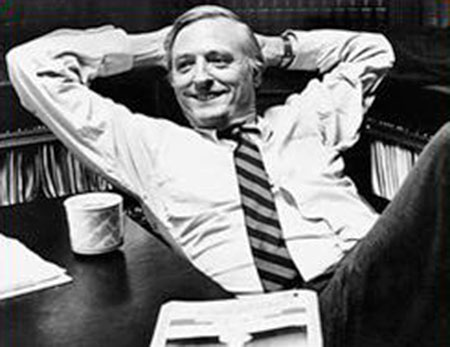
William F. Buckley, Jr.
George de Mohrenschildt’s foreign trips - and some of his domestic wanderings as well - drew the interest of various American law enforcement agencies.
These incidents appear to have been deliberate
provocations, such as his working on "sketches" outside a U.S. Coast Guard
station. In many of these cases de Mohrenschildt would be briefly questioned
or investigated, the result of which was a dossier not unlike that of Lee
Harvey Oswald’s.
These files were full of declared doubts about
his loyalties and speculation at various times that he might be a Russian,
Japanese, French, or German spy. A classic opportunist, he might have been
any or all of these.
But he also could have simply been an American
spy who was creating a cover story.
|
Revealing that which is concealed. Learning about anything that resembles real freedom. A journey of self-discovery shared with the world. Have no fellowship with the unfruitful works of darkness, but rather reprove them - Ephesians 5-11 Join me and let's follow that high road...
